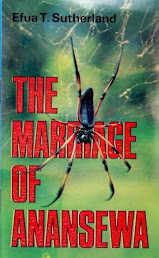 |
"The Marriage of Anansewa" is a play written by Efua Sutherland, a renowned Ghanaian playwright. The play is a satire that explores themes of love, marriage, and societal expectations in a traditional Ghanaian setting. The story is a clever adaptation of the traditional Ananse folktales, which are popular in Ghanaian culture.
The play revolves around Anansewa, a beautiful, intelligent, and strong-willed young woman who has been proposed to by three suitors: Kofi, a wealthy businessman; Kojo, a charming but untrustworthy man; and Aku, a humble and genuine teacher. Anansewa's father, Ananse, is eager to marry her off to the highest bidder, but Anansewa has other plans.
As the play unfolds, Anansewa uses her wit and cunning to test the suitors and their true intentions. She sets conditions for each suitor, which they must meet before she agrees to marry them. Kofi promises to build her a grand house, Kojo promises to take her on a luxurious trip, and Aku promises to support her education and career aspirations. Meanwhile, her father's greed and obsession with wealth and status are exposed, leading to comedic moments and satire.
Through Anansewa's character, Sutherland highlights the importance of education, independence, and self-respect for women. Anansewa's determination to make her own choices and resist societal pressure is a powerful statement on gender roles and expectations. The play also critiques societal pressures and the commodification of marriage, where women are seen as commodities to be bought and sold.
The play's themes are further explored through the characters of the suitors. Kofi represents the corrupting influence of wealth and materialism, while Kojo embodies the dangers of charm and deceit. Aku, on the other hand, represents the values of honesty, hard work, and respect for women. Through these characters, Sutherland shows that true love and compatibility are more valuable than wealth and status.
The play's language and style are also noteworthy. Sutherland uses a blend of Ghanaian proverbs, folk songs, and storytelling techniques to create a unique and engaging narrative. The play's dialogue is rich in humor, satire, and wit, making it a delightful read for students.
In conclusion, "The Marriage of Anansewa" is a thought-provoking and entertaining play that explores themes of love, marriage, and societal expectations in a traditional Ghanaian setting. Through its clever adaptation of folktales and satire, the play critiques societal norms and expectations, making it valuable for every reader
SNIPPET OF THE ACTS IN THE PLAY
Here is an act-by-act summary of "The Marriage of Anansewa" by Efua Sutherland. (Just a snippet. There is a link a the end of each Act where you can read up the full summary of each Act)
Act 1
The play opens with Ananse, a wealthy and respected man in his community, boasting about his daughter Anansewa's beauty and intelligence. He has received three marriage proposals for her and is eager to choose the suitor who will offer the highest bride price. Anansewa, however, is not interested in any of the suitors and wants to make her own choices.
The three suitors, Kofi, Kojo, and Aku, arrive at Ananse's house to make their proposals. Kofi, a wealthy businessman, promises to build Anansewa a grand house. Kojo, a charming but untrustworthy man, promises to take her on a luxurious trip. Aku, a humble and genuine teacher, promises to support her education and career aspirations.
Anansewa is not impressed by their proposals and sets conditions for each suitor. She asks Kofi to build a school for the community, Kojo to bring her a rare bird's feather, and Aku to write a poem in her honor. The suitors agree to her conditions, but Ananse is unhappy with his daughter's demands.
Click here to get the full summary of Act 1
Act 2
As the suitors work to meet Anansewa's conditions, their true characters are revealed. Kofi uses his wealth to try to bribe the community into building the school for him. Kojo tries to deceive Anansewa by bringing a fake bird's feather. Aku, however, writes a beautiful poem that touches Anansewa's heart.
Meanwhile, Ananse's greed and obsession with wealth and status are exposed. He is willing to sacrifice his daughter's happiness for a high bride price. Anansewa's mother, however, supports her daughter's choices and encourages her to follow her heart.
Click here to get the full summary of Act 2
Act 3
The suitors return with their offerings, and Anansewa chooses Aku as her husband. Kofi and Kojo are disappointed and angry, but Ananse is furious that his daughter has chosen the suitor with the lowest bride price.
In the end, Anansewa and Aku get married in a simple ceremony, surrounded by their friends and family. Anansewa's decision to choose love and compatibility over wealth and status is celebrated, and the play ends with a sense of joy and hope for the future.
Click here to get the full summary of Act 3
Act 4
The final act of the play is a celebration of Anansewa and Aku's marriage. The community comes together to rejoice in the union of the two lovers. Ananse, however, is still unhappy with his daughter's choice and refuses to attend the ceremony.
As the play ends, Anansewa and Aku are seen living happily together, surrounded by their friends and family. The play ends with a sense of hope and renewal, as the characters look forward to a bright future.
Click here to get the full summary of Act 4
Overall, "The Marriage of Anansewa" is a play that explores themes of love, marriage, and societal expectations in a traditional Ghanaian setting. Through its use of satire and traditional folktales, the play critiques societal norms and expectations, and celebrates the power of love and compatibility.



0 Comments
Your response is important to us. Leave your response or comment here